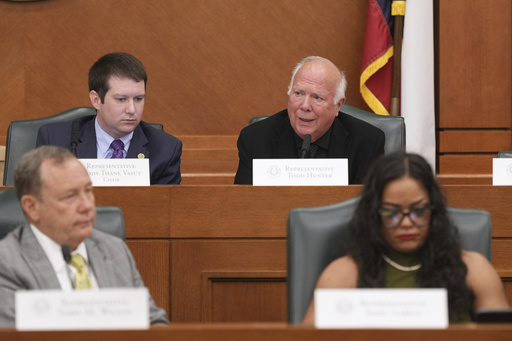Democratic lawmakers in Texas expressed concern on Friday over a proposed redistricting plan by Republicans that they argue would undermine the voting power of Black and Hispanic communities. They claim the plan seeks to increase Republican control in the U.S. House by creating more districts favoring the GOP. This effort is believed to be supported by former President Donald Trump, aiming to bolster the party’s narrow majority in the House.
During a state House committee hearing, the Republican architect of the map conceded that the proposal could help the GOP gain five new seats in Texas. The House committee was set to vote on the proposal over the weekend, with a potential House vote scheduled for early next week before moving to the Texas Senate.
Faced with limited options to counter the plan during a special 30-day legislative session, Democrats from other states urged their counterparts to retaliate. While they could potentially disrupt proceedings by walking out, Democrats in Texas risk incurring fines and leaving essential flood relief measures unattended, measures they argue should be prioritized instead.
Republicans pushed back against accusations that the redrawing of district lines would disenfranchise minority voters. They argue the new map could enhance representation by consolidating communities that were previously divided. Nonetheless, critics warn the redistricting could jeopardize the seats of four Hispanic and two Black congressional incumbents, altering the Texas congressional delegation from a 25-13 GOP edge to a 30-8 advantage.
Former Democratic U.S. Representative Colin Allred criticized the proposed map as an overt power play, promising legal and electoral challenges to the proposed changes. Historically, Texas had to gain federal approval for redistricting under the 1965 Voting Rights Act due to past discriminatory practices. However, this requirement was struck down by the Supreme Court in 2013, allowing states more freedom in drawing districts.
Republican state Rep. Todd Hunter, the plan’s advocate, highlighted that four of the five new districts would have significant minority populations and that the total number of Hispanic-majority districts would increase by one. He defended the partisan nature of the redistricting as permissible by the Supreme Court.
Democratic officials fear that a successful redistricting campaign in Texas could spur similar efforts in other states, potentially leading to a nationwide reshaping of congressional districts. This has prompted Democratic governors and lawmakers in states like California and New York to consider redistricting to favor their party, even though both states use independent commissions for drawing district lines.
Democrats in Texas have discussed strategies to block the legislative process, such as withholding quorum, which is mandatory for conducting business in the Texas House or Senate. However, no official plan has been declared, and such actions could delay vital legislation, including flood relief measures.
House members currently face daily fines for absence, and they are barred from using campaign funds to cover these penalties. Rep. Rhetta Bowers criticized Gov. Greg Abbott and the GOP for leveraging urgent flood relief efforts to advance what she described as racially biased district maps.
The possible changes could significantly impact state politics. Under the current district lines used in the 2022 and 2024 elections, Republicans have consistently won their seats, while Democratic candidates have prevailed in districts favoring Biden. The proposed map could drastically alter this dynamic, leading to potential losses for Democratic incumbents, including shifts in voter demographics and district alignments favoring Republican candidates.
For instance, Democratic Rep. Joaquin Castro’s San Antonio district could change from a secure blue zone to one heavily leaning Republican. Similarly, Democratic Rep. Al Green’s district in Houston might lose much of its Black electorate under the proposed map, shifting to favor the GOP.
Amanda McLaughlin, a resident from North Texas, questioned whether altering the state’s political landscape was justified for securing additional seats for the former president, reflecting the broader tension surrounding the redistricting debate.


